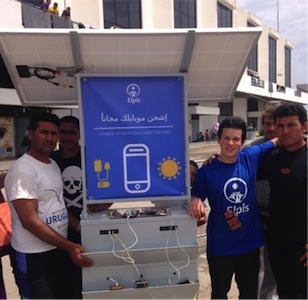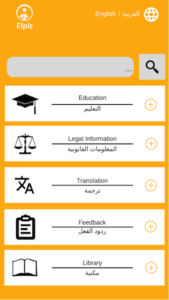Project Elpis has developed six solar-powered hubs, which are charging 18,000 phones per month in Greece. The goal is to upgrade these hubs so refugees can access educational, legal and other useful content securely and reliably. Find out three ways you can help.


We are Project Elpis (Greek for Hope) and we have developed a solar-powered charging station for refugee camps that charges up to 120 mobile phones every single day. We are upgrading our design and will include a Raspberry Pi 3 as a Wireless Access Point within our solar hubs so that users can connect to it over a wireless network and access locally stored educational, legal and other useful content securely and reliably. This content will include a myriad of useful mobile applications, along with educational content such as a library of books that refugees will be able to access on their mobile phones!
Our platform will provide a place where humanitarian digital service providers will be able to directly disseminate their content to refugee communities, by by-passing the knowledge and connectivity gap often encountered when first trying to reach out to refugees with an innovative humanitarian digital service. Currently, there are six solar hubs in operation, charging more than 18,000 phones per month in Greece. The aim is to expand our impact and upgrade all our units with the Raspberry Pi’s at the end of February 2017.
How can you help?
- Content ideas
We welcome ideas, feedback and advice from the Techfugees community on what content we should integrate on our platform. What would be most useful? Do share your thoughts.
- Tell us about your humanitarian digital services
Would you like to feature your own services on our platform? We are seeking voluntary help from programmers, developers, web designers and anyone who would like to partner with us on our platform to disseminate their digital services to refugees.
- Help us develop our user interface
We’re looking for people skilled in web development to help us build a web-based interface similar to the one pictured. We need to lay out the content in a simple manner and offer the option to search.
This includes the following actions:
- Setting up an efficient server and ensuring its security and reliability. Our current server of choice is Jetty, which is built in with Pippo (pictured).
- Ensuring the Wireless Access Point of Raspberry Pi 3 is reliable and adjusted to the anticipated load.
- Developing the website to display the content and setting up a database.
Our primary criterion is performance, since the connection is going to be limited in speed and capability. Therefore, we want to develop the application as lightweight and efficient as possible, while keeping it maintainable.
Our choice for a web framework is Java Pippo. Since the same criteria apply to the database, we want to develop with H2. For the user interface, we want to keep it simple and intuitive, both for user experience and performance reasons.
- Setting up automated deployment. We want to be able to set up any new Raspberry with the help of automated deployment. This should make it very easy to keep the different Raspberries across developers in sync as well.
- Ensuring the Raspberry is running on minimal possible power consumption. This would include disabling unnecessary interfaces and removing unnecessary packages, possibly doing other tweaking as well.
- Measuring the server and Raspberry performance and power consumption for statistics. This could be useful to us in order to know where we could improve, and to people doing similar projects. Also, we want to keep logs of user activity.
Keep in touch with Project Elpis
If you can help with the website build, have ideas for content or would like to put your own humanitarian digital services on our platform, please get in touch!
- Contact us directly via email
- Join us Facebook
- Visit our website for more information
Looking forward to hearing from you all!
Project Elpis Team, Students at the University of Edinburgh
